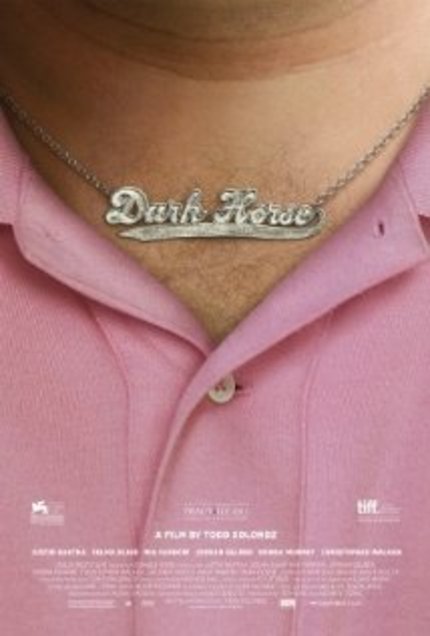Review: DARK HORSE Gallops to Difficult Finish Line

Jordan Gelber as Abe (his parents labeled him the "dark horse" of the family when what they really meant was "black sheep") does his best to embody the gawd-awful enabled, frustrated, repression of an aging man-child. He doesn't just collect action figures (no inherent awfulness in that in and of itself, no matter how "off" certain media would like to color it as), but routinely prowls the Toys R Us returns counter over nearly non-existent "defects" in his purchases, demanding to see the manager in an outraged huff. ("I still have the receipt!!!") In a word, he's awful. Our gaze is forced onto this anti-movie character, a guy who radiates no warmth, only resentment, but succumbs to the default notion that he deserves an attractive, rail-thin girlfriend.
Several years ago, I was having lunch with a perpetually down-on-his-luck friend. He'd taken to subsiding on cheap frozen pizza in his crowded, dingy, shared apartment, playing video games and surfing the web all day. He had gotten it into his head that an upperly mobile, attractive female was within his relational reach. Perhaps I was overly insensitive, but I felt someone had to be a truthsayer, asking him point blank, "What do you have to offer her?" Off guard, unable to shuffle for a better answer, I got the response "I can offer her me!" "Everyone can say that. What else you got?" Harsh, maybe. But I truly do hope it helped. (Today, this friend is considerably more rooted in reality and I believe may even be a productive member of society. I claim no credit, other than being a so-so friend. What was I doing out with him that day? Probably hunting for mint condition action figures for my own collection.) (I still have the receipt. But probably not the figures.)
The point is, so many of us (by default) have bought into this delusional, entitled, self-centeredness, having cast ourselves as the stars of our own all-important movie lives. (Pick up Neal Gabler's thought-provoking book "Life: The Movie" for much more on this.) Abe has no one telling him the truth about himself, urging him to look in the mirror and consider reality. No one he'll listen to, anyway. For Solondz - and to his credit - this state is never touted as a systemic or even an altogether familial failure. It's just another dark reflection of the human condition. And as things eventually unravel for Abe, with his off-kilter girlfriend he shouldn't have (Selma Blair) and a secretary at work (Donna Murphy) who seemingly isn't what he had her pegged as, the second half of the movie becomes a series of reality-bending tangents where neither the viewer or the protagonist can truly know what's what. Abe may remain a distant "dark horse", but this aspect of the movie brought a surprising level of compelling tension to the fold. Abe's movie, both in his head and the one we're watching, gets weird.
In any case, we got a film on our hands that stars the kind of character that they generally don't make movies about. And, quite frankly, it's understandable why they don't. From the start, Abe is presented as downright unlikeable. Rather gutsy on the part of Solondz, but I gather that he's one filmmaker who never exactly shies away from showcasing humanity at it's not so finest. Abe is an overweight pathetic shlub who sports geek-superior t-shirts and, in the beginning, thinks he's got everyone else figured out. He's been living and working for his financially well-off parents, played by Christopher Walken and Mia Farrow (Solondz seems to derive great pleasure from disguising these recognizable stars with bad hair and/or gaudy glasses), and despising every minute of it. He's caught somewhere between denial of his own painful loserdom and a narrow, blind devotion to himself. (Which is all he knows.) Is the film laughing at him, or merely pointing out his embarrassing ticks, foibles, and behaviors? This is the kind of guy that most of us have known, and hopefully aren't.
The utter low budget of DARK HORSE shows (apparently the store name on the side of the Toys R Us Abe frequents had to be removed, so the filmmakers simply blurred it out. At least that was the case on the screener I watched), but Solondz does his thing. Or so I'm told, so I've read. This being my first Todd Solondz film, I can't compare it to his other works, some of which are quite infamous.
With its compelling presentation and gutsy character approach, DARK HORSE won me over in a surprising way. That's not to say I'd collect a set of action figures based on the film, but that's not for lack of having done so in the past with many other movies. Quite frankly, I'm out of room.
(DARK HORSE continues it's North American theatrical run in indie and art house theaters.)
- Jim Tudor

Do you feel this content is inappropriate or infringes upon your rights? Click here to report it, or see our DMCA policy.






